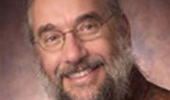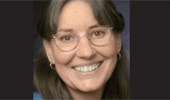By Ellie Koewler ’15
Dr. Elliot Abrams and Dr. AnnCorinne Freter-Abrams, two professors of Anthropology, are retiring at the end of this semester and entering semi-retirement.
Abrams earned a B.A. Anthropology from SUNY-Buffalo, and a master’s and Ph.D. from Pennsylvania State University. His areas of specialization include Mesoamerican Archaeology, Ohio Valley Archaeology, Architecture, and Economics. Freter-Abrams earned her B.A. in Anthropology from the University of San Diego, her master’s from the University of Houston, and Ph.D. from Pennsylvania State University. Her research interests include Mesoamerican Archaeology, Cultural Ecology, Environmental Archaeology, Maya Settlement and Landscape Archaeology, Maya Domestic Economy, Gender in Prehistory, Archaeological Chronology, and Obsidian Hydration Dating.
The two first came to Athens after Abrams earned a position at Ohio University in fall of 1985. “I was delighted with the job opportunity. It was a nice balance between teaching and research,” he says.
The position also enabled Abrams to create the Field School in Ohio Archaeology, with its first group of students starting excavations in the summer of 1986. The first Field School focused on the Boudinot 4 site, an Adena habitation site. Domestic sites like the Boudinot 4 site became the research focus for subsequent Field Schools. Over the course of his time here, Abrams conducted 15 summer field schools.
“It was a privilege to do archaeology in the local area and pull undergraduates into research,” he says.
By fall 1986, Freter-Abrams began as an instructor and eventually earned full professor, the first female anthropologist to do so at Ohio University. She says many of her most memorable experiences involve research collaborations with students, many of which resulted in student publications, presentations, and posters.
“We’ve had so many great students who have gone on to do remarkable things, from completing Ph.D.s to law school, medical school, becoming Peace Corps and Vista volunteers, or working in contract archaeology, and cultural resource management firms,” says Freter-Abrams. “We’re so proud of all of them.”
Dr. Paul Patton, Assistant Professor of Anthropology and Director of the Field School, began his career working with the couple as an undergraduate Anthropology major at Ohio University, and he then went on to get an M.S. in Environmental Studies with them as his advisers. Patton’s dissertation, from Ohio State University, was the first ever to focus on Hocking Valley archaeology, drawing upon the rich Field School data amassed over the years.
“Dr. Abrams and Dr. Freter-Abrams have both contributed significantly to our understanding of the first peoples of the Hocking Valley,” says Patton. “As they transition to retirement, I hope that they can reflect with great pride on the substantial impact they have had on our knowledge of the past, as well as the impact they have had on the future through the students they have trained and mentored.”
Abrams and Freter-Abrams, along with their anthropology colleagues, worked to enhance experiential learning opportunities in the major. “ The anthropologists had a strong emphasis and vision of the program to make sure opportunities existed for students to have hands-on learning during their time here in each subfield,” explains Abrams. This goal led to the success of programs such as the Spring Break trip to Northern Ireland studying human rights, law, justice, and culture led by Dr. Haley Duschinski. Dr. Nancy Tatarek also leads experiential learning courses in biological anthropology through her work in the Appalachia Population History Project with Patton.
Over the years, the two have seen the Department of Sociology & Anthropology grow and develop in many ways.
“When we first started here there was no internet…so we’ve seen technology bring tremendous visuals to classrooms that we couldn’t do before,” Freter-Abrams says.
“Technology has been unbelievably revolutionary to presenting information to students,” adds Abrams.
Gender equity and diversity also has increased dramatically within the department. “There were two women in the whole department when I started,” explains Freter-Abrams. “Now we’re over 50 percent female, which has been great to see.”
Among offered courses, each has favorites. Freter-Abrams especially enjoys teaching introductory courses in cultural and archaeological anthropology.
“I like intro [courses] because students often walk in and they don’t even know what anthropology is. By the end, they’re walking out saying, ‘Wow! This is really cool!’” She also enjoys teaching ANTH 3450/5450: Gender In Cross Cultural Perspective, ANTH 3780/5780: Human Ecology and ANTH 3670/5670: South American Prehistory.
Abrams’ favorites include ANTH 4560: Field School in Ohio Archaeology and ANTH 3700: Mexican/Central American Prehistory, as his first area of research was in Mesoamerican prehistory.
Both Abrams and Freter-Abrams will return for several fall semesters to teach courses. They look forward to traveling and to seeing their son, Zach, finish his Ph.D. from Ohio State University’s medical school.





















Comments